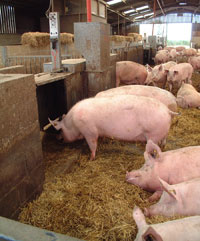Global pigmeat imports tightened after swine flu outbreak

Governments across the world are considering tightening rules on pork imports after a deadly outbreak of swine flu killed at least 81 people in Mexico.
Despite global health officials insisting pork is safe to eat, governments are reported to have increased screening of pigs and pork products being imported from the Americas.
Others, including Russia and Serbia, have banned pigmeat imports from the continent outright.
In addition to the deaths in Mexico, suspected cases have also been identified in France, Spain, North America and New Zealand, prompting calls for quarantines, tighter pork import rules and testing of airline passengers.
The World Health Organisation said the virus has the potential to become a pandemic and was encouraging countries to do anything they felt could be a precautionary against the disease.
Measures could include travel and trade restrictions.
However some governments have warned against a panic reaction, warning that farmers could lose millions of dollars if consumers stopped buying pigmeat in the way they boycotted poultry during the bird ‘flu outbreak in 2005.
Symptoms of the illness include a fever, body aches, coughing, a sore throat, respiratory congestion and in some cases, vomiting.
The virus is usually contracted through direct contact with pigs, but the UN said those who had been infected had not had contact with any.
The strain, H1N1, is the same strain that causes seasonal flu outbreaks in humans, but the detected version contains genetic material from versions of flu which usually affect pigs and birds.
There is currently no vaccine against swine flu and it is unclear how much protection current human flu vaccines might offer.
